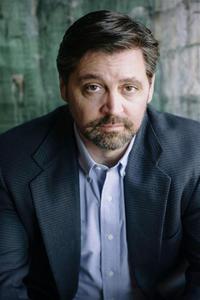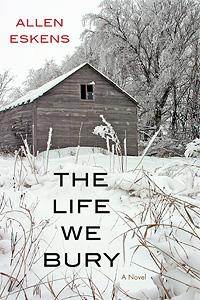
|
|
| photo: Daniel Dinsmore | |
Allen Eskens is a criminal defense attorney with a penchant for writing fiction. He honed his creative writing skills through the MFA program at Minnesota State University as well as classes at the Iowa Summer Writing Festival and the Loft Literary Center in Minneapolis. He is a member of the Twin Cities Sisters in Crime. The Life We Bury (just published by Seventh Street Books) is his first novel.
On your nightstand now:
I just finished reading Fear of Beauty by Susan Froetschel, a terrific novel about a clash of cultures in the mountains of Afghanistan. It's told from two points of view, an American soldier and a female Afghan villager. I am just now starting Dante's Poison, a mystery novel from Chicago author Lynne Raimondo. On deck after that is Flight Behavior by Barbara Kingsolver.
Favorite book when you were a child:
I don't recall reading books as a child. I know I did, but I was always a slow reader and preferred to daydream my own stories. My very first report card in first grade informed my parents that I daydreamed too much. That theme repeated itself throughout grade school. However, I believe that my daydreaming was the starting point of my later desire to be a writer. I was creating characters and plots in my head, and now, I simply put those characters and plots on paper.
Your top five authors:
My goal is to write literary mysteries, and the author who most inspires me in that pursuit is Dennis Lehane. I also like the work of Tana French. Both of these authors have series that rely upon a community of characters so that a supporting character from one story can be the protagonist in the next. I like that idea and have planned my books in a way that moves through a handful of alternating protagonists.
I like also John Sandford, a Minnesotan author who has captured the flavor of Minnesota in his writing. And, although I am not a particular fan of horror, I am a fan of Stephen King. I admire his ability to move from horror stories like Carrie to stories like Rita Hayworth and Shawshank Redemption with the same amazing quality. His use of analogies can often rival the best literary writers, and his understanding of suspense techniques is unparalleled. I remember a conversation I overheard in my MFA program where one student was deriding Stephen King as being low-brow, genre fiction. That student couldn't have been further from the mark.
And I cannot complete a list of my top five without including my all-time favorite: Harper Lee.
Book you've faked reading:
The Catcher in the Rye by J.D. Salinger. It's an American classic, but it did little for me.
 Book you're an evangelist for:
Book you're an evangelist for:
Vision Quest by Terry Davis. The clean writing style and honest depiction of the protagonist's story is evocative and enjoyable to read. They made a movie of it in 1985, but the book's ending is much better than the movie's, in my opinion.
Book you've bought for the cover:
Iron Lake by William Kent Krueger. I was browsing through a bookstore, wondering what I wanted my own book cover to look like, seeing what covers jumped out at me, when I saw the cover for Iron Lake. I liked the cover so much that I bought the book and have been a fan of his ever since.
Book that changed your life:
The Outsiders by S.E. Hinton. Around the time I started high school, I read it and felt an immediate affinity for Ponyboy. I was the son of a drywaller, so sensitivity and intellectual self-awareness were not necessarily encouraged. I had a blue-collar path planned for me, but I always felt at odds with that plan--kind of the way that Ponyboy felt at odds with how people saw him only as a greaser. I think that book spurred me to examine myself and ask if there were something beyond housing construction to which I might aspire. That change of thinking ultimately led me to go to college and law school. And now it guides me as I dip my toe into the world of being a novelist.
Favorite line from a book:
There are so many wonderful lines from To Kill a Mockingbird that it's hard to choose one. A new tidbit of wisdom will catch my eye every time I reread that novel, but I particularly like this line from Atticus Finch: "They're certainly entitled to think that, and they're entitled to full respect for their opinions... but before I can live with other folks I've got to live with myself. The one thing that doesn't abide by majority rule is a person's conscience."
Which character you most relate to:
Atticus Finch in To Kill a Mockingbird by Harper Lee. I don't pretend to have his wisdom, but I approach everything with a slow intellectual examination. Even my most impulsive acts seem to be heavily planned and researched.
Book you most want to read again for the first time:
Where the Red Fern Grows by Wilson Rawls. This is the first book to ever make me cry (it was also the second and third book to make me cry). In high school, it came to me as assigned reading and at one point of the story (I won't give away the details), I lost it. I then went back to reread it in the attempt to get through it without tears. I failed. Now I get teary-eyed as I approach the sad chapter. I think it would be nice to once again experience that turn without knowing what is about to come.

